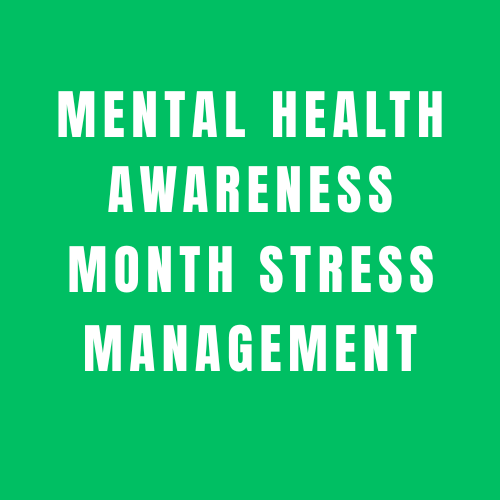Understanding Mental Health Awareness Month Stress Management
Mental health awareness month stress management is not just an entry on a calendar—it’s a reminder to put mental wellness first in all aspects of life. One of the most significant issues that emerges during this period is the management of stress. Being able to handle pressure, overwhelm, and emotional exhaustion is crucial to maintaining a healthy and balanced lifestyle. That’s where Mental Health Awareness Month and stress management become so important.
Why Mental Health Awareness Month Matters
Each May, organizations, health workers, and communities unite to promote mental well-being awareness. The intention is to de-stigmatize, offer assistance, and talk openly about conditions usually kept under wraps.
Still, awareness is valuable, but action is even more vital. This is the reason why mental health awareness month stress management campaigns are centered on offering realistic tools to tackle life’s everyday issues.
The Impact of Stress on Mental Health
Stress is likely to have severe effects on mental and physical well-being. It may cause depression, anxiety, sleep disorders, as well as physical illnesses like high blood pressure. It is for this reason that it is paramount to learn and embrace mechanisms that trigger relief from stress.
Throughout Mental Health Awareness Month, people are encouraged to check their stress levels and make a few changes to safeguard their emotional health. Using mental health awareness month stress management strategies can enhance quality of life.
Practical Tips for Managing Stress
1. Create a Daily Routine
Organization is a strong antidote. A daily routine eliminates unpredictability, which is a significant source of stress for so many individuals. Schedule time for work, downtime, and sleep.
2. Stay Active
Daily exercise is a surefire way to reduce stress. Exercise releases endorphins improves mood, and improves sleep. A walk is a natural therapy.
3. Practice Mindfulness and Meditation
Mindfulness allows a person to remain present and focused. Meditation lowers rumination, decreases anxiety, and enhances emotional stability. Both practices are integral components of mental health awareness month stress reduction measures.
4. Seek Social Support
Discussing things with someone you trust, be it a friend, family member, or counselor, can make all the difference. Social support produces a feeling of belonging and takes away feelings of loneliness.
Nutrition and Sleep: Two Underrated Stress Tools
Nutrition and sleep are also big contributors to emotional well-being. Well-balanced meals offer the brain nutrients required to regulate mood. Similarly, good sleep rejuvenates body and mind, and it becomes simpler to cope with everyday pressures.
Several experts point out that some of the effective mental health awareness month stress coping includes eating habits as well as sleeping patterns.
Limit Digital Overload
Constant reminders, bad news, and social media comparisons contribute to stress. Regular screen breaks reset the mind. Mental Health Awareness Month is the perfect time to set digital boundaries.
Professional Help is a Sign of Strength
Reaching out to a counselor, therapist, or psychiatrist is not a sign of weakness—it is a sign of self-care. These professionals offer techniques and tools to navigate mental challenges effectively. Including professional guidance in your mental health awareness month stress management plan ensures a more sustainable approach to wellness.
Small Habits Lead to Big Change
It is vital to keep in mind that habits that are small yet consistent make long-term improvements. A five-minute breathing practice, writing down your thoughts, or learning to say no to added commitments all work to the benefit of a healthier mind.
When individuals proactively engage with mental health awareness month stress management, they learn year-round things that help them.
Final Thoughts
Mental Health Awareness Month is an ideal moment to take a step back, look inward, and seize control of your well-being. Stress is a part of life, but it doesn’t have to be in charge of your life. With proper mental health awareness and stress management, people can enjoy increased focus, healthier relationships, and a restored sense of peace.

